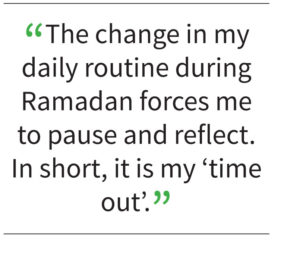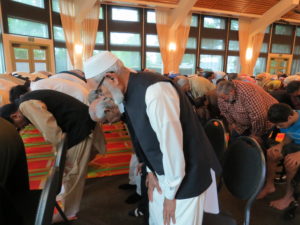Published in the June 20 – July 3, 2018 issue of Morgan Hill Life

Bakri Musa
To many Muslims and non-Muslims alike, Ramadan means fasting, and only that. Viewed as such Ramadan can be challenging, more so in our food-celebrated culture.
However, Ramadan is more than just fasting from sunrise to sunset. It is a time to pause and to ponder, to be forgiving and to seek forgiveness, and to be generous not only to others but equally important, oneself. It is also a time for self-restraint and self-discipline.
Unlike the other tenets of Islam like praying, paying tithe, and pilgrimage to Mecca, fasting is a private and personal act. Living in secular and predominantly non-Muslim America, nobody forces me to fast. There are no religious police wandering around looking for sinners, as in my native Malaysia. I fast because I want to, and for that reason it is much more meaningful.

In today’s harried and hurried world, it is easy to be caught up in the maelstrom. The change in my daily routine during Ramadan forces me to pause and reflect. In short, it is my “time out.”
The quiet of the morning, with ample time now available that was previously consumed with preparing and eating breakfast, is ideal for contemplation. Those moments, alas, are only too rare during my regular day.
My lunch break is now my most productive time as I am alone in my office, uninterrupted. I can also count on losing five to 10 pounds during Ramadan. It is flattering to hear comments on how fit I look at the end of the month!
Concomitant with the change in my daily routine is the alteration of my metabolism. The inevitable reduction in caloric intake can only be good for my body. Scientists tell us that it enhances longevity, at least in laboratory animals. There is no disputing that excess caloric intake and the consequent obesity is today’s major public health issue.

Experts also tell us that after a few days of fasting we begin breaking down our fat cells. The weight-reduction aspect aside, that invigorates our stem cells, especially those of our intestines. This in turn enhances healing and disease prevention, as well as mitigates the effects of aging. No surprise that experts now advocate fast-mimicking diets.
Sadly today, fasting in many Muslim societies has been “modernized,” with evenings consumed with never-ending feasts. Many gain weight during Ramadan; their gluttony switched from daytime to nighttime, the very antithesis of the spirit of restraint called for during Ramadan.
The traditional teaching is that fasting reminds us of the hunger endured by those less fortunate. It is hard to empathize with the poor when you know that your own hunger will be satiated — no, indulged upon — come sunset.
An element of even greater import during Ramadan is charity. For those who for a variety of reasons cannot fast, the giving of charity is an acceptable substitute. Just as important is the generosity of spirit and the renewal of family and societal bonds, as expressed in our communal iftars (breaking of the fast).
I am blessed with good health that I could partake in fasting; peace that I could do it with tranquility; and prosperity that I could fulfill my charitable obligations as well as being assured that my fast will end come sunset. I am also mindful that millions of others are less fortunate, which makes me even more thankful of my blessings.
Last Friday, June 15, our community celebrated Eidul Fitri, the end of Ramadan. Following a communal prayer, with everyone dressed in their finest, many in their traditional attires, the rest of the day was spent visiting friends and family, enjoying, as expected, food and other tasty treats!
Bakri Musa is a local surgeon and former president of South Valley Islamic Community.

 In today’s harried and hurried world, it is easy to be caught up in the maelstrom. The change in my daily routine during Ramadan forces me to pause and reflect. In short, it is my “time out.”
In today’s harried and hurried world, it is easy to be caught up in the maelstrom. The change in my daily routine during Ramadan forces me to pause and reflect. In short, it is my “time out.” Experts also tell us that after a few days of fasting we begin breaking down our fat cells. The weight-reduction aspect aside, that invigorates our stem cells, especially those of our intestines. This in turn enhances healing and disease prevention, as well as mitigates the effects of aging. No surprise that experts now advocate fast-mimicking diets.
Experts also tell us that after a few days of fasting we begin breaking down our fat cells. The weight-reduction aspect aside, that invigorates our stem cells, especially those of our intestines. This in turn enhances healing and disease prevention, as well as mitigates the effects of aging. No surprise that experts now advocate fast-mimicking diets.



0 Comments:
Post a Comment
<< Home